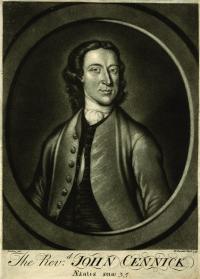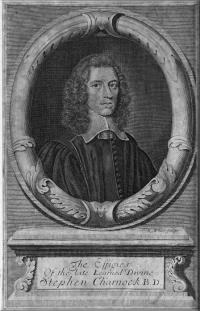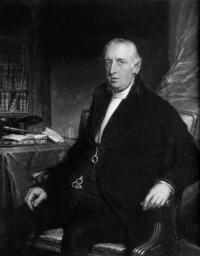Oliver Cromwell: father of Irish republicanism?
Published in
Confederate War and Cromwell,
Cromwell,
Early Modern History (1500–1700),
Features,
Issue 6 (Nov/Dec 2010),
Volume 18

The Wood Street congregation had particular Cromwell connections. Revd John Owen (top) came to Ireland with Oliver Cromwell as his chaplain and preached at Wood Street in 1650.
Oliver Cromwell’s government sponsored two congregations of Protestant Dissenters in Dublin between 1649 and 1660. One of them met at Wood Street and the other at ‘Saint Nicholas-within-the-walls’, close to Christ Church Cathedral. Both of these communities flourished from the mid-seventeenth century until well into the nineteenth. For more than 140 years the ministers at these meeting-houses advocated notions of civil and religious liberty. The radical religion and politics that they developed contributed to the foundation of the Society of United Irishmen in 1791, to the rebellion of 1798 and to its after-shock, Emmet’s rebellion of 1803.
The Wood Street congregation (which later relocated to Strand Street) was founded by Puritans who came to Dublin to escape persecution during the reign of Elizabeth I. Revd John Owen (1616–88), one of the most eminent Puritan theologians of his era, came to Ireland with Oliver Cromwell as his chaplain and preached at Wood Street in 1650. He had previously preached at Westminster Abbey the day after the execution of Charles I, when he praised the regicides as ‘the Lord’s workmen’. Another link to the Cromwell family who often preached in Wood Street was Revd Stephen Charnock, personal chaplain to Oliver Cromwell’s son Henry when he was military commander in Ireland in 1653.

Another regular preacher there was Revd Stephen Charnock (above), personal chaplain to Cromwell’s son, Henry, when he was military commander in Ireland in 1653. (Dublin Unitarian Church)
The St Nicholas-within community (later located to Eustace Street) was founded in 1650 by Samuel Winter from Warwickshire, who was sent to Dublin by Cromwell to become provost of Trinity College. The fortunes of both congregations changed at the Restoration of Charles II in 1660, when they suffered ejection and attempted suppression. Yet they survived and continued to make a contribution to the religious, philosophical and, ultimately, political life of the city of Dublin.
It is not clear when these congregations drifted into the heresy of Unitarianism. At some point they ceased to subscribe to the doctrine of the Trinity, which holds that God consists of the Father, Son and Holy Spirit. For them there was only one God, ‘the Father’. They denied that Jesus was God or the son of God. Revd Owen could never have imagined that his Dublin Dissenters would eventually embrace this ‘abominable heresy’. (Owen had published a refutation of Unitarianism at the request of Oliver Cromwell in 1654.)
The Cromwellians had come to Ireland to extirpate the native Irish population and the Roman Catholic faith. Yet nearly a century and a half later members of the two Dublin congregations emerged as the advocates of a union of Catholics, Protestants and Dissenters in support of political and economic reform. The evolution from sectarianism to liberalism within Protestant Dissent was a process of profound change, but there was also a pattern of continuity and consistency through the generations. The change involved the shedding of Calvinist beliefs. They rejected the notion of predestination, that God has decided who is elect and who is damned. Their belief in a benevolent deity led them to reject the doctrines of original sin and eternal damnation, but they retained core principles such as their opposition to the Anglican established church and they insisted on the right of every individual to freedom of conscience.

In the 1720s Francis Hutcheson, ‘father of the Scottish Enlightenment’, his cousin William Bruce, a noted publisher
During the 1720s Francis Hutcheson, ‘father of the Scottish Enlightenment’, his cousin William Bruce, a noted publisher, Revd John Abernethy and Revd Thomas Drennan (father of William Drennan, the United Irishman) formed a group of philosophers and clergymen linked to the Wood Street meeting-house. They collaborated in publishing Hutcheson’s work, but they also republished the works of English Civil War republicans and Commonwealthmen such as John Harrington and the notorious heretic John Toland.
Francis Hutcheson left Dublin in 1730 to take up a post at Glasgow University. There he instilled in his students a liberal, democratic and anti- slavery philosophy. Many of the Presbyterian clergymen within the ranks of the United Irishmen, including four who lost their lives in the 1798 Rebellion, were graduates of Glasgow. Revds James Porter, Alex Gowdy, Archibald Warwick and Boyle Moody were associated with the liberal Presbyterianism then known as New Light but these days known as non-subscribing Presbyterianism. Today in counties Antrim and Down and in Belfast non-subscribers are known within their Protestant communities as
Unitarians.
When the Dublin Society of United Irishmen was founded in 1791, members of the Strand Street congregation such as William Drennan and Archibald Hamilton Rowan were prominent in the new venture. Oliver Bond and Henry Jackson were Presbyterian businessmen. Their secret republican committee in the Strand Street/Pill Lane area was referred to by the infamous informer and newspaper publisher Francis Higgins (a.k.a. ‘the Sham Squire’) as the ‘king-killers of Pill Lane’. Several informers referred to Bond as Oliver ‘Cromwell’ Bond. Higgins may have been referring to the execution of King Louis XVI of France but the epithet could equally have been applied to the Cromwellian executioners of Charles I, a point rammed home repeatedly in United Irish counter-propaganda.

In the 1720s Francis Hutcheson, ‘father of the Scottish Enlightenment’, Revd John Abernethy and Revd Thomas Drennan (father of William Drennan, the United Irishman) formed a group of philosophers and clergymen linked to the Wood Street meeting-house. They published Hutcheson’s works, but also those of English Civil War republicans and Commonwealthmen such as John Harrington and the notorious heretic John Toland. (Dublin Unitarian Church)
Strand Street had a long-standing special relationship with First Presbyterian Rosemary Street, Belfast. William Drennan was born ‘a son of the manse’ there in 1751. Leading United Irishmen Samuel Neilson, Sam McTier and William Tennant worshipped at Rosemary Street. Revd William Bruce (nephew of the publisher) had left Strand Street, Dublin, in 1791 after twenty years when ‘called’ north to Rosemary Street. Later that year, Wolfe Tone came to Belfast for the inaugural meeting of the United Irishmen. Having imbibed a few glasses of wine, Tone quarrelled with Revd Bruce over the issue of immediate Catholic emancipation. Tone described Bruce as ‘an intolerant high priest’. He knew that Unitarians abhorred intolerant high priests. HI
Fergus Whelan’s Dissent into treason: Unitarians, king-killers and the Society of United Irishmen has just been published by Brandon Books.




















